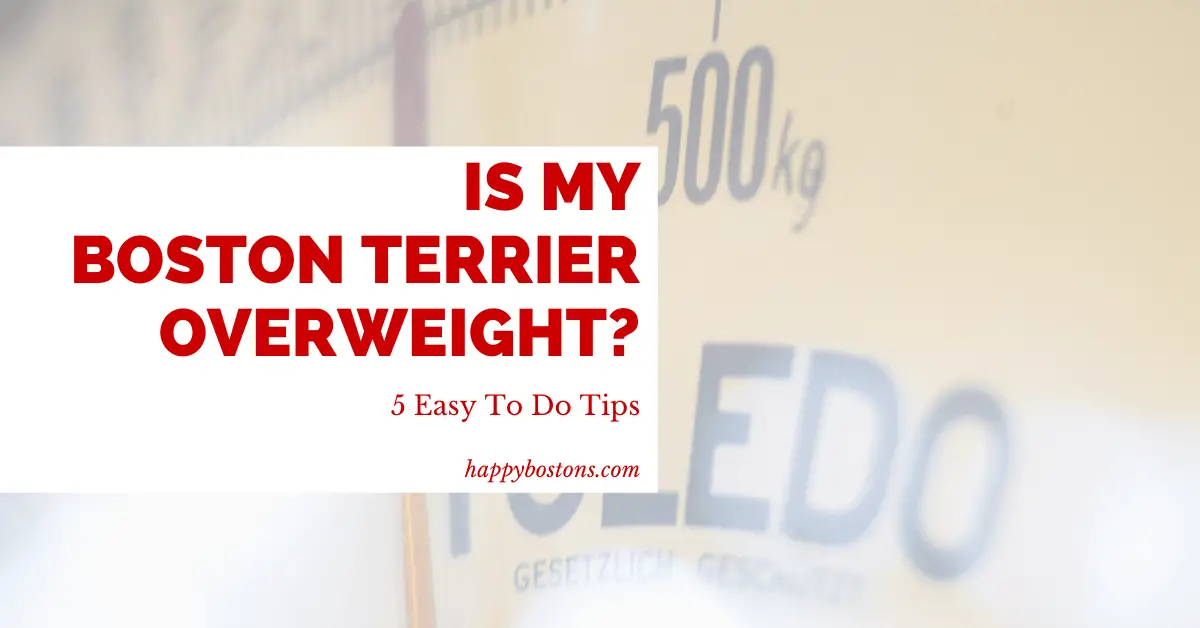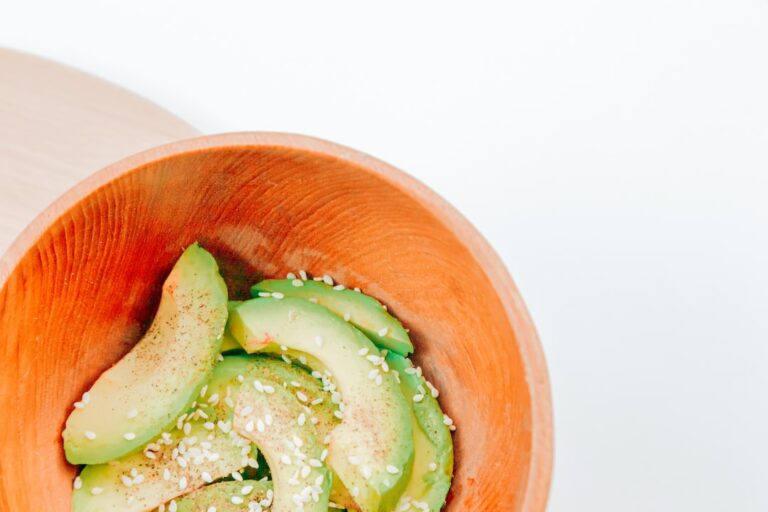5 Easy To Do Tips – Is My Boston Terrier Overweight?
Boston Terriers love to eat. Our Bostons, Bridgette and Ryder, love their food, carrots, popcorn, and anything else they can get their paws on. But, we have to watch their waistline.
Is my Boston Terrier overweight? If your adult Boston Terrier is over 25 lbs, it may be overweight. If your Boston Terrier is under 16 inches tall, a lower weight may be appropriate. Signs of an overweight Boston Terrier include trouble going up the stairs, less pronounced waistline, easily tired, and an overall lack of energy.
With an average lifespan of 12-15 years, weight is one component of a happy, long life. Just a quarter-cup more or less of dog food per day can make a difference.
How can I tell if my Boston Terrier is overweight?
Figuring out if your Boston Terrier is overweight only takes a few minutes.
There are 5 signs of an overweight Boston Terrier.
- Weight over 25 lbs
- Barrel body shape
- Difficulty scratching an itch
- Labored breathing
- Tires easily
- New difficulty going up stairs
So, how do I weigh my dog?
The first step is to find the weight of your Boston. One of the easiest ways to do this is first to weigh yourself (A). Then pick up and hold your Boston and weigh both of you together (B). Then subtract your combined weight from your individual weight.
B – A = Boston’s Weight
For example, if I weigh 145lbs by myself and 165 lbs when holding Bridgette, she weighs 20 lbs.
165 – 145 = 20 lbs
If your Boston is an adult and weighs over 25 pounds, it is overweight. Anything over 22 pounds is worth monitoring once a month as part of a regular health routine. However, weight is not the only factor.

On a healthy dog, you should be able to run your fingers over its ribs without feeling a thick layer of fat. The ribs should not be protruding too much or the dog may be underweight.
Look at your Boston from the top down. You should see wide shoulders and chest that significantly narrow to its waist.
Next, look at your Boston from the side profile. You should see a tall chest that narrows at the stomach and waist.
From either view, if your Boston looks more barrel-shaped, it may have a weight issue.
Does your Boston Terrier have difficulty scratching a particular itch? That may be a sign that they are a bit more fat than they ought to be.
If you have any questions or concerns, always seek advice from a veterinarian.
Overweight Bostons and why it matters
So, why does it matter if my Boston Terrier is overweight? The two primary concerns are lifespan and quality of life.
Obesity in dogs is similar to obesity in humans. The effects of canine obesity can infiltrate many different areas of a dog’s health.
Dogs who are overweight, including Boston Terriers, are more at risk for orthopedic disease, cardio-vascular, cardio-respiratory disease, anesthesia complications, skin issues, and certain types of cancer.
Reading the paper entitled The Growing Problem of Obesity in Dogs and Cats by Alexander J. German, I found a few interesting observations.
- “… obesity in dogs is associated with the number of meals and snacks fed, the feeding of table scraps, and the dog’s presence when its owners prepared or ate their own meal”
- “… the type of diet fed (prepared pet food vs. homemade) does not appear to predispose to obesity”
- “… the price of the pet food does have a notable effect, i.e., obese dogs are more likely to have been fed inexpensive rather than more expensive foods.”
So, if you want to implement changes based on these observations, let’s go to our Top 10 Tips in the next section.
5 Tips – Keep a healthy Boston Terrier weight
Whether your Boston Terrier is overweight or not, we want to manage their weight. Here are 10 easy tips to help manage your Boston Terrier’s weight.
1. Use a high-quality dog food
We know that cheap is not always healthy. However, feeding your Boston Terrier should not break the bank either.
Look for a dog food that has the following attributes:
- Specific named protein source as first ingredient (chicken, beef, salmon)
Grain-Free orhigh-quality carbs like rice, barley, potatoes.- Stay away from corn, soy, or wheat.
- A named fat source is helpful. 9-18% high-quality fat is good depending on your Boston’s lifestyle. More active, higher fat.
In 2023, under the advice of our vet and the passing away of Bridgette, we changed the food we feed all of our dogs. We no longer use a grain-free food based on the recent potential links to heart problems.
We found the absolutely best food and the difference in our dogs is amazing! If you don’t know what to get, please try the Purina Pro line of foods. In particular, our dogs absolutely love the Purina Pro shredded chicken and rice formula.
Not only is this food better for them but they absolutely love it!
Here’s a couple of links to help you find it easily and you support this site by doing so. Win-Win
2. Stay out of the kitchen
No, not you. We mean your Boston. As the study above observes, we are much more likely to give our dogs a “treat” while we are preparing food and they are staring at us with those gorgeous eyes.
Teach them to stay out of the kitchen while you are cooking or making a snack for yourself.
3. Exercise 1 hour per day
No matter the weather or if you like to walk or not, you have to give your Boston exercise. 1 hour per day is the minimum.
This can be a walk or run but can also be a serious game of tug-of-war or fetch. Find something that fits your lifestyle and gets your Boston to exert a ton of energy. Get two Boston Terriers and let them tire each other out. j/k
Heck, break it into two separate 30 minute sessions. Just get them moving.
4. Low-calorie snacks
Use low calorie, healthier snacks. For instance, try fruits or vegetables, in moderation. Yes, Bostons can have bananas.
Our Bostons go bonkers over baby carrots. We use them often as a healthy treat that also cleans their teeth a bit and ensures they have fiber in their diet.
5. Adjust meal size
If you have already worked on all the other items above, you may simply be over-feeding your Boston Terrier.
An average size Boston Terrier should be fed 1 cup of dry dog food, or equivalent, per day.
We split this into two, half-cup, servings during the day for our Bostons.
Related Questions
What is the heaviest Boston Terrier? The largest Boston Terrier may have well been Endicott the Mighty who passed away in 2012 who actually lived in Boston, MA. He was reported as weighing in at 50 pounds. The second heaviest might be Brody, a 44 pound Boston Terrier reported on ibostonterrier.com
What dog foods are best for Boston Terriers? There is no single dog food that is best for Boston Terriers. If someone tells you that, they are probably getting a commission to sell it.
You want to look for high-quality dog foods. Personally, we have been feeding our Boston Terriers the Natural Balance small breed Salmon and Sweet Potato food for about 5 years.
We noticed they had more energy and fewer stomach issues with this Limited Ingredient Diet food than we used in the past.
There are plenty of other good options out there. Do your homework and find something you can easily get. Nobody wants to run out and have your Boston experience stomach issues by having to switch suddenly to another food.




![Boston Terrier Itchy Skin [Ultimate Guide]](https://happybostons.com/wp-content/uploads/2021/02/Boston-Terrier-Itchy-Skin-Ultimate-Guide-768x402.png)

